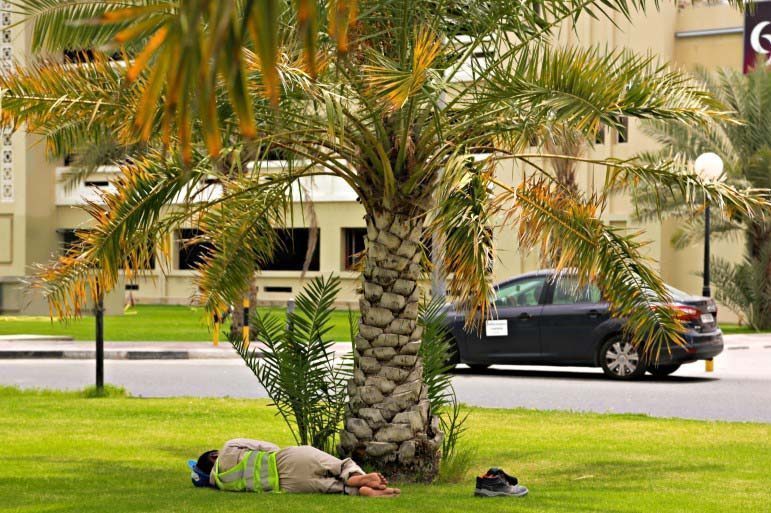
Hasan S. moved to Qatar from Bangladesh about three weeks ago. The unmarried young man, believed to be in his early 20s, had come here to work as a construction laborer.
Within days of his arrival, Hasan befriended fellow workers from his home country, as well as several other South Asian migrants who lived in his company-provided accommodations near Mushereib, his former housemates recall.
“Everything was good,” said one man, who asked not to be named. “He was living in a room with 11 other men, all Bangladeshi. Everybody liked him. They ate together and slept together.”
But on Saturday, when his colleagues rose for work around 4am, Hasan opted to stay behind.

No one thought to ask why. When everyone returned to the multi-level apartment block some 12 hours later, one of Hasan’s housemates found the door to the shared bathroom locked.
He waited roughly half an hour before forcing the door open and finding Hasan’s body, hanging. The young man appeared to have committed suicide.
Housemates who spoke to Doha News the day after Hasan’s death said they were at a loss about what could have prompted him to take his life. They said this is the first time such an incident has happened in their apartment block, which is home to nearly 200 men living in 14 rooms.
Still, Hasan’s case is not an isolated one.
Few details
Understanding and addressing complex issues of mental health, anguish and despair is difficult in the best of environments.
It’s even more challenging in the case of migrant workers in Qatar and elsewhere in the Gulf, where low-income laborers – who frequently work long hours, lack independent transportation and face language barriers – may have trouble finding and seeking help.
Even quantifying the number of foreigners who take their own lives is problematic.
Indians make up Qatar’s largest expat population, with some 500,000 individuals residing in this country. Sashee Kumar, the Indian embassy’s labor officer, told Doha News that the diplomatic mission tracks suicides in the community, but does not disclose figures.
“We don’t want any panic in the Indian community, saying people are coming to (Qatar) and killing themselves,” he said.
When pressed, Kumar said the number of Indians who commit suicide in Qatar is “very, very small considering the size of the population.”

Meanwhile, officials at the Nepali embassy in Doha could not be reached for comment.
However, a Nepali newspaper reported earlier this year that 12 nationals of that country killed themselves in Qatar between 2013 and 2014 (the exact time frame was not specified). There are roughly 400,000 Nepalese citizens living in Qatar.
But an official at the Bangladesh embassy said that, prior to this week, there had been no reports of suicide this year among any of the nearly 170,000 Bangladeshis living in Qatar.
When asked if it was possible that suicides were underreported or misclassified as accidents, the embassy official – who asked not to be named – said he wasn’t sure, as the diplomatic mission relies on local law enforcement and medical officials to determine and classify causes of death.
Small steps forward
While isolated incidents are reported in the media, such as a Tunisian teenager who jumped to his death at City Center Mall six years ago and an Indian man found hanging in his company’s accommodations last month, suicide is not a topic that’s openly discussed in Qatar.

Medical experts have said that there was no record of a Qatari committing suicide prior to 2010. Meanwhile, the country’s comprehensive National Development Strategy acknowledges social problems like domestic violence and depression, but makes no mention of suicide.
Some, however, are working to raise awareness of the issue.
Last year, the Social Rehabilitation Center (Al Aween) organized a bike ride to mark the suicide prevention day.
Meanwhile, Rumailah Hospital – part of Hamad Medical Corp. – operates a psychiatric department that provides day programs, residential care, home-based outreach and crisis intervention.
The department says it makes contact with some 1,700 patients monthly, in addition to operating a 60-bed facility.
The most frequently admitted patients are domestic workers, Amnesty International said in a report published earlier this year.
The report stated:
“Anxiety or depression caused by deception about work was the number one cause of admission to the unit … Attempted suicide was the most common reason for admission.”
Additionally, more than a dozen domestic workers visited the unit daily in 2012 to be treated for anxiety related to job stress, culture shock and anger management.
Unique stresses
Amnesty researcher James Lynch told Doha News that migrant workers often face unique stresses, such as knowing family members back home are depending on them for financial support.
The nature of Amnesty’s work results in the organization’s staff coming across cases of migrants in despair over labor-related issues, such as unpaid wages and an inability to leave Qatar and return home.
“People feel completely helpless. They may be in debt, and things may have gone really badly for them (abroad). They can’t go home and start rebuilding things. Every day, things are getting worse and they’ve lost control,” Lynch said
In one extreme case, Amnesty documented how an Indian worker – who had been unpaid for months and unable to secure an exit permit or his passport from his employer, Krantz Engineering – pointed to a specific date on a calendar, saying he would commit suicide by setting himself on fire if he could not return home in time for his wedding.
He was ultimately able to fly back to India, but his fiancee broke off their engagement because of the delay in his return.

But as Hasan’s case shows, outward signs of stress and root causes are not always visible.
Furthermore, many of the recommendations of experts – such as establishing crisis telephone hotlines, closer monitoring of patients being treated for depression and more mental health training for medical staff, imams, teachers, parents and family counsellors – fail to address some of the unique challenges migrant workers face in accessing professional assistance.
However, local health officials say they recognize the problem and want to fix it, according to Lynch.
He said the Supreme Council of Health identified mental health as one of the most important medical issues it needs to address during a meeting with Amnesty last year on migrant workers.
Lynch added that officials told him that mental health was one of their top priorities, and that more outreach efforts were planned.
Back outside Musheireb, some of Hasan’s clothes and possessions remain on his top-bunk bed.
His former colleagues asked Doha News if anything can be done to support Hasan’s family, who they assume will have to pay off the QR15,000-QR20,000 recruitment fee that they all paid to come to Qatar.
A Bangladeshi embassy official told Doha News that the diplomatic mission expediates all the necessary paperwork that would enable the repatriation of a deceased national.
However, he added that it’s generally up to the individual’s employer to arrange for the body to be transported to the individual’s home country.
Doha News was unable to reach Hasan’s employer for comment.
Thoughts?
Note: Doha News has chosen not to publish Hasan’s last name out of respect for his family.







